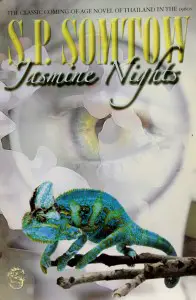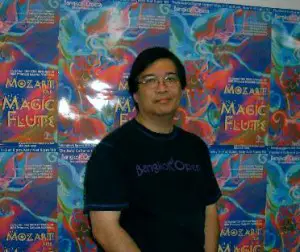 Jasmine Nights by Thai-American author S.P. Somtow is a coming of age, semi-autobiographical novel which has recently been re-republished by Diplodocus Press. The book’s first edition was published in 1994 by Hamish Hamilton and then it was followed by Penguin Books (1995) and Asia Books (2001). For those who follow the Thai classical music scene, the author is also know after his full name, Somtow Papinian Sucharitkul, a renowned composer and conductor at Bangkok Opera, where he spends most of his time as their artistic director.
Jasmine Nights by Thai-American author S.P. Somtow is a coming of age, semi-autobiographical novel which has recently been re-republished by Diplodocus Press. The book’s first edition was published in 1994 by Hamish Hamilton and then it was followed by Penguin Books (1995) and Asia Books (2001). For those who follow the Thai classical music scene, the author is also know after his full name, Somtow Papinian Sucharitkul, a renowned composer and conductor at Bangkok Opera, where he spends most of his time as their artistic director.
The action of Jasmine Nights takes place in the Bangkok of early 1960s and follows the adventures and misadventures of Justin, a 12-year-old inquisitive boy, who feels “an alien” in his own country. Out of the fifty-three books Somtow has published ever since he took up writing, at least in Thailand, Jasmine Nights is one his most well-known books.
Internationally, as a writer, S.P. Somtow is mostly known for his science fiction, fantasy and horror writings. In 2002, he was the recipient of the World Fantasy Award for Best Novella for The Bird Catcher, a story based on the Thai serial killer Si Oui, whose mummified body can be seen at the Forensics Science Museum within the Siriraj Hospital in Bangkok. He had won and been nominated to many other awards and, in 2011, The Nation named Somtow Sucharitkul as one of the most internationally acclaimed Thai citizens. His novels have been translated into many languages, thus reaching an even wider international readership.
The storyline in Jasmine Nights has quite a complex plot structure and deals with the main character’s philosophical musing, time shifts, metaphysical dialogues, visions, imaginary dialogues, and historical cross-references. Although Justin is Thai, he speaks no Thai and refuses to make any effort at learning the language.
 While his parents are abroad on some unspecified diplomatic mission, Justin in left in the care of aging relatives living in an idyllic compound in Bangkok: “It is January of the year 1963 and I am a creature of two worlds. In one of these worlds I am a child. The world is circumscribed by high stucco walls topped with broken glass. By day the sun streams down and the mangoes glisten in the orchard behind the blue Gothic mansion with its faux Corinthian columns, the houses of my three grandmothers and of our familial patriarch. Evenings, the jasmine bushes bloom, and the night air sweats the choking sensuality of their fragrance. Three other houses stand on the estate: my bachelor uncle’s, uncompromisingly Californian in its split-level ranch style and adobe brick walls; the wooden house of my three maiden aunts, whom I call the three Fates, with its pointed eaves, backing out on to a pavilion above the pond, where I live among intimate strangers; and last, the ruined house, which is the entrance to my other world.”
While his parents are abroad on some unspecified diplomatic mission, Justin in left in the care of aging relatives living in an idyllic compound in Bangkok: “It is January of the year 1963 and I am a creature of two worlds. In one of these worlds I am a child. The world is circumscribed by high stucco walls topped with broken glass. By day the sun streams down and the mangoes glisten in the orchard behind the blue Gothic mansion with its faux Corinthian columns, the houses of my three grandmothers and of our familial patriarch. Evenings, the jasmine bushes bloom, and the night air sweats the choking sensuality of their fragrance. Three other houses stand on the estate: my bachelor uncle’s, uncompromisingly Californian in its split-level ranch style and adobe brick walls; the wooden house of my three maiden aunts, whom I call the three Fates, with its pointed eaves, backing out on to a pavilion above the pond, where I live among intimate strangers; and last, the ruined house, which is the entrance to my other world.”
Although the novel abounds in numerous Thai words, which are clearly explained at the end of the book in a comprehensive vocabulary, Jasmine Nights is a very easy book to read. At a superficial level, we can say that this is due to the fact that the book is structured into short chapters, fifty-two in number, each of them not more than twenty pages long. According to the writer himself, “The book is written in short chapters because it was serialized in the Bangkok Post and each chapter was not allowed to be longer than two thousand words and had to end in a cliffhanger.”
One of the most captivating chapters is the 41st one, titled “Inferno.” It deals with one of Justin’s psychedelic dreams. In this dream he has an interview with his dead chameleon and his great-grandmother who, in real life, was struggling between life and death. The title of this chapter also reveals one of the major themes of the novel: death.
The book was written in English and is littered with references from Greek mythology and Western pop culture. The fact that S.P. Somtow grew up in several European countries and studied at Eton and Cambridge might be one of the reasons why he makes reference to so many Western philosophers as well as motion pictures, such as Spartacus, starring Kirk Douglas, or Alfred Hitchcock’s Psycho. It is also worth mentioning that Somtow had directed a few low-budget movies during his stay in Los Angeles.
Affectionately referred to as Little Frog, according to S.P. Somtow, “despite having absorbed so much from books, Justin’s quite immature in many ways, especially compared to kids today.” Here’s why: “In my other world I am not a child. I am what I choose to be. I speak the language of the wind. I have synthesized this world out of images in history books and story books and books of poetry and from half-remembered scenes of England. There is a room with as many books as there are stars. There is an attic where I have fought the Trojan War a thousand times over, fine-tuning the outcome with my fellow Olympians. There are more rooms in the ruined house than I have ever counted. I have lived inside the walled universe for almost three years. Travel in and out of the universe is accomplished by means of a silver-green Studebaker driven by a man in a khaki uniform, whose name I have still not learned. I am an alien here. I sweat like a pig all the time. I forget to bathe. I have never uttered a word of the language; my tongue will not form the words, even though over the years I have begun to grasp their meaning. My numerous relations do not know I understand them, and they address me in a stilted Victorian English which I refer to as ‘eaughing’, since it so frequently makes use of the phoneme ‘eaugh’. Some of the servants have begun to realize I am not deaf; they regard my refusal to speak Thai as an eccentricity, one of the many inscrutabilities of the privileged. They call me Master Little Frog.”
Jasmine Nights also explores the Thai people’s belief in ghosts, in spirits, in shamanism, and their religious piety. The books also takes a stand against social injustices and tackles the issue of dark skin vs fairer skin, of poor people vs rich people, of the social acceptance of transsexuals (katoyes), and the Thai’s general attitude towards sex.
George Axelrod, Oscar-winning writer of Breakfast at Tiffany, called S.P. Somtow the “S.D. Salinger of Siam” and Jasmine Nights has often been compared with The Cather in the Rye. It is thus not surprising that, a few years ago, Jasmine Nights was compulsory reading in the Master of Arts program at Assumption University of Bangkok. But, I believe the novel should be on the reading lists of all international (and why not government) school in the Kingdom. After all, the year 2012 is The Year of English Speaking in Thailand and Bangkok has been designated by UNESCO as the World Book Capital 2013.
S.P. Somtow’s soon-to-be released book The Stone Buddha’s Tears will be published by Post Books, while his next book, one that he’s been working on for years, is called Jade and it’s part of the Dragonstones Trilogy. But until these can be found on bookshelves, you can purchase Jasmine Nights at most bookstores in Thailand, while for Somtow’s other books, you can browse his online bookstore and the one at Diplodocus Press. To read more about his work, visit S.P. Somtow’s official websites (www.somtow.com and www.somtow.org) or find him on Twitter (@somtow) and Facebook.
Originally published in “Bangkok Trader” (Vol. 6, No.10, September 2012)


